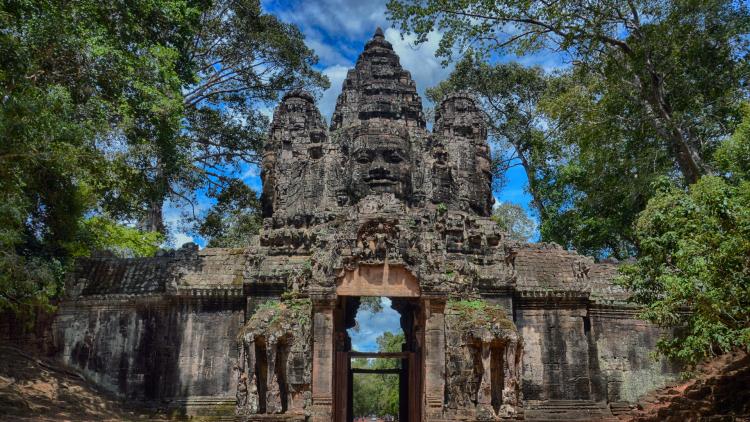H212 Frontiers in History

Key information
- Start date
- End date
- Year of study
- Year 2 or Year 3
- Duration
- Term 2
- Module code
- 154800302
- FHEQ Level
- 5
- Credits
- 15
- Department
- Department of History
Module overview
The study of ‘Frontiers’ (along with Borders and Borderlands) has gained increasing currency across the social sciences and arts and humanities in recent years, but presents particular challenges to historians.
This is because there has been a strong orientation, particularly in writing histories in and of the global south, to follow either an Area Studies or national history framework. Frontiers embrace those frameworks but also challenge their limitations for understanding the history of the non-western world and the interconnectedness of global history. This module challenges students to explore new research methods, as they need to think creatively about source materials that can shed light upon the histories of regions about which there are often few historical records.
The module, therefore, will continue in a meaningful way the conversation that began in year 1 of the undergraduate history programme about the strengths and weaknesses of traditional paradigms of area studies and national histories, encouraging students to maintain multilateral interests in their historical studies, while also exploring global history from alternative perspectives and analysing more deeply the nature of historical enquiry in its own right through this framework. SOAS is uniquely able to offer a module of this kind because of the expertise and active research of many of its staff in this field.
Prerequisites
- Students enrol via the on-line Module Sign-up system. Students are advised of the timing of this process via email by the Dept. administrator
Objectives and learning outcomes
LO1. Distinguish what makes a research question historical, identifying the strengths and weaknesses of different approaches to a problem and of the possibilities and limits of various kinds of sources.
LO2. Produce and refine such a question through the identification of, engagement with, and critique of existing historiography, using the conceptual tools of the module to reframe prior learning.
LO3. Integrate material from a variety of sources, both primary and secondary, in order to explore a research question and hypothesis.
LO4. Present the findings of the research in a way that demonstrates a capacity to think conceptually, while developing competency as a historian.
Scope and syllabus
As noted above, the concept of Frontiers by definition challenges traditional paradigms of historical teaching and learning in that it enforces a multilateral approach to historical enquiry at its core. This is not pursued through the meta-narrative of international relations (although it may incorporate that) but poses real questions about how one may learn about places, spaces and times that intersect area studies boundaries and which may additionally not be rich in traditional documentary source material. Paradoxically, however, such has been the fascination with frontiers throughout human history that the desire to control and ‘civilise’ frontiers has also at times produced great richness in historical material.
The imaginary of the frontier – and the interactions, connections and mobilities that frontiers facilitated – often prompted a desire to collect, to record, to visualise and materialise the cultures of the frontiers at the centre. This also means that there is a great deal of primary material (not always textual) in archives in and around London relating to a range of Frontiers from different times and places, which students will be able to access. In so far as the Frontier became a site of self-reflection about the centre, these materials also offer something distinctive in understanding the histories of nations and centres that form part of the undergraduate degree in other years.
The course will combine the development of concepts in relation to approaching the study of Frontiers with the detailed historical study of a case study in the second half of the course. This will ground the concepts taught in the first five weeks in the empirical understanding of specific times, places, communities and events. The selection of these case studies will change from year to year depending upon the expertise of the convenor. The current roster of case studies includes: the modern construction of frontiers in the imagination and their influence on state-making in East and North Africa; Islamic cosmopolitanism in the Middle East and North Africa; encounters in precolonial South Asia; the creation of the north east frontier in South and upland Southeast Asia; and China as constituted by its trans-regional frontiers, with a particular focus on the 17th-20th centuries.
Students will, however, be able to develop an essay based on a Frontier of their own interest, deploying both the conceptual frameworks and the interpretive model of the convenor’s case study to develop their own small research project. This will be a valuable training for the scaling up of the research in the third year. This could take the form of an ISP that is related directly to Frontiers arising from this study, or it could inform the methodological approach of the dissertation at a general level and be part of the preparation for that independent research.
Part I. Concepts
- Frontiers: a concept in human history
- Natural frontiers
- Frontier imaginaries
- Frontiers and borders
- Frontiers and governance: old and new frontier
Part 2. Case studies
Each case study will develop around five common themes, the order of which may change, but which will emphasize the use of primary sources, as appropriate.
- Frontiers as spaces of encounter
- Conceptualising frontiers as spaces of encounter
- How frontier communities shape political, cultural, and military centres
- Frontiers as spaces of migration and human mobility
- Old and new frontiers: global frontiers and mobilities
Method of assessment
- Exam (50%)
- Essay, 2,000 words (50%)
Disclaimer
Important notice regarding changes to programmes and modules.

